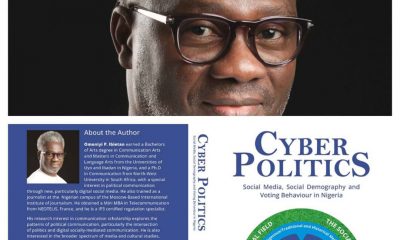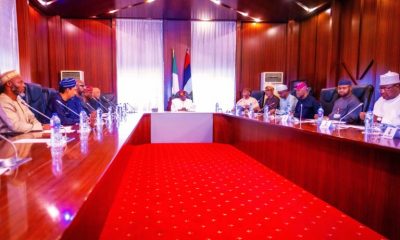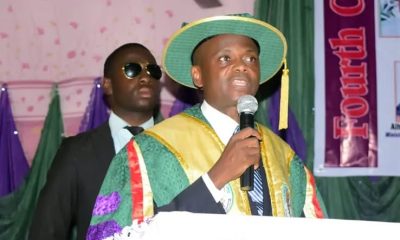ICT
NCC moves to ensure MNOs networks are LTE compatible
Published
7 years agoon
By
Olu Emmanuel
The Nigerian Communications Commission (NCC) has resolve that Nigeria is not left behind in the advancement of new technology in Information and communications technology (ICT) service delivery the Commission has begun move to ensure that all mobile network operators (MNOs) network in the country are Long Term Evolution (LTE)-compatible.
The Long-Term Evolution (LTE) is a standard for wireless broadband communication for mobile devices and data terminals, based on the GSM/EDGE and UMTS/HSPA technologies. It increases the capacity and speed using a different radio interface together with core network improvements.
Also LTE is the upgrade path for carriers with both GSM/UMTS networks and CDMA2000 networks. The different LTE frequencies and bands used in different countries mean that only multi-band phones are able to use LTE in all countries where it is supported.
Prof. Umar Garba Danbatta, Executive Vice Chairman/CEO Nigerian Communications Commission (NCC), who was represented by Ismail Adedigba, Head, Information and Reference Consumer Affairs Bureau stated this at the ongoing 5th edition of ICTEL EXPO 2019, holding at the Landmark Event Center, Lagos.
According to him, “we are ensuring that all new sites to be built by the mobile network operators (MNOs) are Long Term Evolution (LTE)-compatible.
“We also strive to ensure implementation of harmonised Right of Way (RoW) charges on state and federal government highways at the cost of N145 per linear meter to encourage faster rollout of telecoms infrastructure.
“We are also working with relevant stakeholders to ensure elimination of multiple taxation and regulations; encourage spread of 3G coverage to, atleast 80 per cent of the Nigerian population over the current 56.4%of the population covered with 3G networks.
“Furthermore, the Commission is encouraging the operators’ upgrade of their 2G base transceiver stations (BTSs) to 3G; spread of Fifth Generation (5G) to, at least five per cent of the population; spread of 4G/LTE services to 100 per cent of the population with a minimum broadband speed of 1.5 megabit per second (Mbps); and finally, deployment of at least one Access Point of fiber with a 10 gigabyte per second (Gbps) capacity in all the 774 Local Government Areas (LGAs) of the Federation through the INFRACO.”He noted also that fourth industrial revolution will have the capacity to enhance every facet of our lives, and not just the workforce alone.
The NCC boss revealed that the technologies of the fourth industrial revolution have the potential to connect everything into one giant communicating network.
Danbatta said “the Fourth Industrial Revolution’s technologies, such as AI, augmented reality, robotics, Cloud computing, Big data, Over-the-Top (OTT), Block-chain technology, advanced security systems and 3-D printing, etc., are rapidly changing the way humans create, exchange, and distribute value.
“As with previous revolutions, this will profoundly transform institutions, industries, and individuals.
“More importantly, this revolution will be guided by the choices that people make today: the world in 50 to 100 years from now will owe a lot of its character to how we think about, invest in, and deploy these powerful new technologies.
“Suffice it to state that the Fourth Industrial Revolution involves a systemic change across many sectors and aspects of human life and as such, the crosscutting impacts of emerging technologies are even more important than the exciting capabilities they represent.
Engr. Gbenga Adebayo, President of Assocation of Licensed Telecommunications Operators of Nigeria said that every industrial revolutions we have witnessed in the time past was associated with one form of technical innovation or the other, noting that these technical innovations were protected by the government before it thrived
He added however, that in Nigeria, the case is not the same, that government is not doing enough to protect stakeholders in the industry.
Adebayo who was represented by Mr Aremu Olajide said every revolution started with an innovation, an enabler and they complement each other but unfortunately in Nigeria the challenges that exist does not encourage for the right infrastructure to be provided.
He noted that if the challenges in the information and Communications Technology sector is not addressed the quest to be part of the fourth industrial revolution will be a mirage.
He explained that every enabler in the sector should complement each other, adding that if we don’t get it correct at any stage, we cannot move to another stage.
He reiterated that for us to get it, infrastructure must be provided at all level of the economy.
According to him, “Government should declare these enablers a national critical infrastructure, create an environment for the youth to be innovative, create a smart city initiative, find lasting solutions to protecting infrastructure.
“All these put in place will ensure a conducive environment for 4IR to thrive,” he said
You may like


Ibietan’s book on cyber politics for public presentation 25 July


Tinubu holds meeting with MTN Group Chairman, NCC Vice Chairman


NCC debunks reports on 5G network operation in Lagos


NCC speaks on fibre optic cable laying in Lagos, others


NCC dismisses reports linking 5G network to Coronavirus


NCC fines Airtel, 3 others N2.9bn over infractions
Trending

 Latest3 days ago
Latest3 days agoYoruba film industry mourns as popular actress aunty Ajara passes away

 Trends4 days ago
Trends4 days agoTonto Dikeh reunites son with Churchill after decade-long split

 Energy1 week ago
Energy1 week agoNNPC unveils gas master plan to boost Nigeria’s energy sector

 Education1 week ago
Education1 week agoAchievers University expels 15 female students over indiscipline

 Business6 days ago
Business6 days agoRite Foods positions industry as catalyst for Nigeria’s clean energy transition

 Football6 days ago
Football6 days agoArsenal’s Osman Kamara completes permanent move to Blackburn Rovers

 Health5 days ago
Health5 days agoControversial preprint revives vaccine–autism debate, draws sharp pushback from medical experts

 Featured1 week ago
Featured1 week agoEPL: Palmer fit for Chelsea’s match against West Ham – Rosenior

